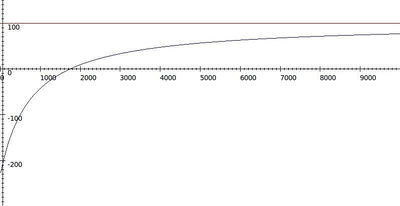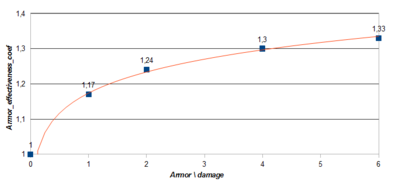Difference between revisions of "Sacred 2:Armor"
(He-he-he, Armor reduction formula...AGRRRRRR!!!) |
|||
| Line 40: | Line 40: | ||
===Armor vs. Damage=== | ===Armor vs. Damage=== | ||
| − | |||
Players who have 0 Armor protection against a damage type will actually have the damage against them multiplied '''above''' the stated amount. | Players who have 0 Armor protection against a damage type will actually have the damage against them multiplied '''above''' the stated amount. | ||
| Line 54: | Line 53: | ||
| − | |||
| − | + | Besides [[Sacred 2:Armor|armor]], opponents in game can have [[Sacred 2:Damage Mitigation|Damage Mitigation]] (DM) modifier for each of five [[Sacred 2:Damage Types|Damage Types]]. The final formula for damage dealt (calculated separatedly for each Damage Type) is: | |
| − | + | '''damage taken = damage dealt * (damage dealt / (damage dealt + damage absorbed by armor)) * (100%-DM) * Armor_effectiveness_coeff''' | |
| − | + | ''Armor_effectiveness_coeff'' is a special multiplier applied to the value of damage dealt when the target of a Combat Art has armor value > 0. | |
| − | + | This multiplier prevents excessive reduction of damage when the armor/damage ratio is extremely high. | |
| − | + | Armor_effectiveness_coeff depends on the armor/damage ratio and has the following values: | |
[[File:111907.PNG|400px]] | [[File:111907.PNG|400px]] | ||
| − | + | Where the OX axis shows the armor/damage ratio , and the OY axis shows Armor_effectiveness_coeff. | |
| − | |||
| − | |||
| − | |||
| − | |||
| − | + | 1) The character whose armor value is equal to the amount of incoming damage, will receive 0.5*1.17 = 58% of the original damage. | |
| + | |||
| + | 2) The character whose armor value is 2 times greater than the amount of damage inflicted by the attacker, will receive 0.33*1.24 = 41% of the original damage. | ||
| + | |||
| + | 3) The character whose armor value is 4 times greater than the amount of damage inflicted by the attacker, will receive X*0.2*1.3 = 26% of the original damage. | ||
| + | |||
| + | 4) The character whose armor value is 6 times greater than the amount of damage inflicted by the attacker, will receive X*0.143*1.33 = 19.2% of the original damage. | ||
| + | |||
| + | *As you can see, the armor effectiveness decreases rapidly at high armor/damage ratio. Even by having the armor value exceed incoming damage by several times the character can not be made immune to this type of damage, because armor effectiveness drops significantly. | ||
==[[Sacred 2:Chance to disregard armor|Chance to Disregard Armor]]== | ==[[Sacred 2:Chance to disregard armor|Chance to Disregard Armor]]== | ||
Revision as of 11:35, 19 May 2014
Armor has two possible meanings in Sacred 2. First, it is the common term for pieces of equipment: helmets, gloves, boots, breastplates, etc. These are the various items that are equipped on the character in the inventory screen.
Secondly, Armor is also the official term for what is commonly referred to as "Resistances": those values for each of the Five Damage Types that directly counter or "resist" incoming damage.
This page will discuss both concepts, as they are highly interconnected, but will primarily focus on Resistances. Detailed information on various pieces of equipment (sets, uniques, etc.) can be found in the links below.
Armor Equipment
Armor equipment in Sacred 2 consists of two types:
- Standard Armor, which can be bought in shops as well as which will drop from enemies. Standard armor will possess a range of different numbers of item modifiers and sockets/slots which are dependent upon the Bargaining level of the character that is making the purchase from a merchant. A character with a larger number of skill points put into Bargaining will be able to see a larger number of items in the merchant as well as be offered armor of much greater value possessing more sockets and better modifiers.
In Sacred 2, players should constantly be looking to upgrade their armor equipment as they level up. Armor equipment is the primay source of Physical resistance for the player, and may also have a vast array of useful modifiers that increase in quality and quantity at higher levels.
Armor Resistances
Just as the player (and opponents) can inflict one of five types of elemental damage, they also have a corresponding Armor value that resists those damage types. The Armor resistance types are:
The primary way the player gains resistance to the four damage types other than Physical (which is gained from Armor equipment) is to equip Relics in the Relic holder. Relics may be found in four colors: Purple (Magic), Blue (Ice), Green (Poison) and Red (Fire). The player can mix and match these relics to enhance their Armor values for any combat situation which may arise.
The Community Patch adds powerful new items called Sigils that can also be equipped in the Relic holder. Sigils offer resistances to all five damage types, including Physical. They are also set items which confer additional bonuses when all Sigils from a set are equipped.
Armor vs. Damage
Players who have 0 Armor protection against a damage type will actually have the damage against them multiplied above the stated amount.
The graph below shows how incoming damage is reduced by armor. Tests were done by people from the German Sacred forum, allowing a wolf to hit the player in Niobium, while varying the player armor. The wolf was doing 244 physical damage shown in last kill. It turned out that at least 1750 armor was needed to suffer no penalty. Below 1750 armour the character actually received more damage than the wolf was doing, above 1750 armour the damage was reduced. From these tests, Chattius of Darkmatters calculated a formula and plotted a damage vs. armor function:
The graph depends on damage, level and difficulty. Its curve is always the same, but the scales on the axis differ.
The player receives more than three times the dealt damage if he has no armor versus the incoming damage-type. Therefore it becomes very important to have at least some amount of armor value for each of the five damage types.
Besides armor, opponents in game can have Damage Mitigation (DM) modifier for each of five Damage Types. The final formula for damage dealt (calculated separatedly for each Damage Type) is:
damage taken = damage dealt * (damage dealt / (damage dealt + damage absorbed by armor)) * (100%-DM) * Armor_effectiveness_coeff
Armor_effectiveness_coeff is a special multiplier applied to the value of damage dealt when the target of a Combat Art has armor value > 0. This multiplier prevents excessive reduction of damage when the armor/damage ratio is extremely high. Armor_effectiveness_coeff depends on the armor/damage ratio and has the following values:
Where the OX axis shows the armor/damage ratio , and the OY axis shows Armor_effectiveness_coeff.
1) The character whose armor value is equal to the amount of incoming damage, will receive 0.5*1.17 = 58% of the original damage.
2) The character whose armor value is 2 times greater than the amount of damage inflicted by the attacker, will receive 0.33*1.24 = 41% of the original damage.
3) The character whose armor value is 4 times greater than the amount of damage inflicted by the attacker, will receive X*0.2*1.3 = 26% of the original damage.
4) The character whose armor value is 6 times greater than the amount of damage inflicted by the attacker, will receive X*0.143*1.33 = 19.2% of the original damage.
- As you can see, the armor effectiveness decreases rapidly at high armor/damage ratio. Even by having the armor value exceed incoming damage by several times the character can not be made immune to this type of damage, because armor effectiveness drops significantly.
Chance to Disregard Armor
This modifier gives each attack a chance to ignore armor in the damage calculation, resulting in more damage being done to the target. A high amount of armor/resistances on the target can have a significant effect on the amount of damage the target receives (especially if the hit is low damage to start with), this can substantially increase the amount of damage the target takes when the effect occurs (see graph above). It is not known whether this mod will also disregard damage mitigation as well as armor resistances.
Armor Lore
Armor Lore is an important skill which improves both the use of armor equipment as well as the Armor resistance values of the player. First, it reduces the movement speed penalty from wearing armor that is higher level than the player. Second, it reduces the regeneration time penalty imposed by all pieces of armor. Third, it unlocks powerful defensive modifiers on armor pieces, like Damage Mitigation. Finally, it increases all of the armor resistance values of the player by a percentage. For these reasons it can be considered one of the most valuable Defensive Skills.
Toughness
Toughness is another powerful Defensive skill that directly affects Armor values. While Armor Lore only enhances existing armor values, Toughness directly adds a flat armor value for each damage type. This means that Toughness and Armor Lore together have a great synergy and can increase the player's resistances greatly. Toughness also adds a percentage of Damage Mitigation, which causes a certain amount of incoming damage to be disregarded before Armor is even calculated against it. A player stacking this modifier may become near-invulnerable to damage even with low armor resistance values.
Combat Arts
Very few Combat Arts affect the player's armor values. Most that provide damage protection do so in the form of Damage Mitigation. However, a select few Buffs do directly improve armor:
![]() Ancient Bark (Dryad) - provides physical armor and increases all armor values by a percent
Ancient Bark (Dryad) - provides physical armor and increases all armor values by a percent
![]() Runes of Protection (Dragon Mage) - provides physical armor and increases it by a percent
Runes of Protection (Dragon Mage) - provides physical armor and increases it by a percent
![]() Crystal Skin (High Elf) - provides physical armor
Crystal Skin (High Elf) - provides physical armor
Damage Types Armor Does Not Affect
- Leech Life From Opponents - This is extra, non-resistable damage.
- Life Leeched Per Hit - This is extra, non-resistable damage.
- Damage Over Time - Damage over time can only be reduced by Recovery Elixirs and by modifiers specifically designed to resist it, such as Damage over Time:Fire - X%. This damage type includes some of the Secondary Damage Effects, such as Chance for Burn.

